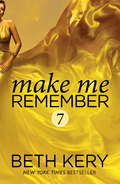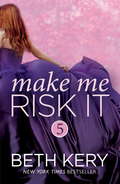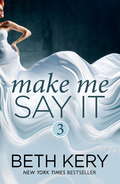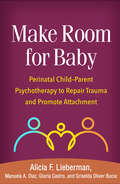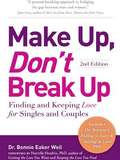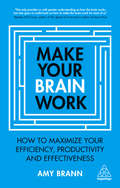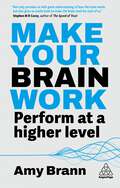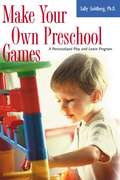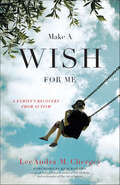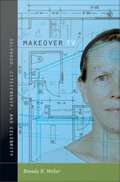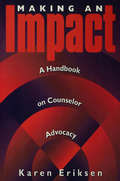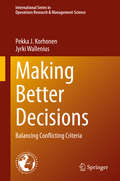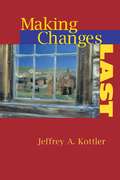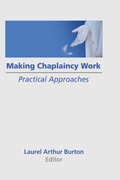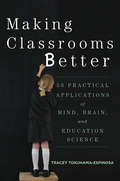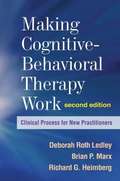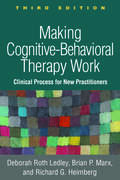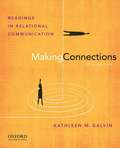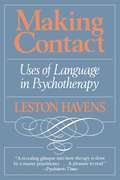- Table View
- List View
Make Me Remember (Make Me)
by Beth KeryFrom the New York Times bestselling author of Because You Are Mine and The Affair, comes Make Me - a tantalizing serial novel about hidden pasts, dangerous obsessions, and uncontrollable passion, perfect for fans of E. L. James, Sylvia Day, Jodi Ellen Malpas and J. Kenner. During sun-drenched, passionate days spent on Jacob's yacht, Harper and Jacob fall deeper in love, taking risks not only with their bodies but their hearts. The only thing standing between Jacob and pure bliss is the suspicion that Harper's memories are returning. If they do, she may never see him the same way again - or let him keep her safe from the horror that she faced as a young girl...The sense of security and trust Harper feels with Jacob has her finally abandoning herself to sensual decadence along with the truth that she's hopelessly in love with this dark, daring man. With her submission to her feelings, sad memories and dreams begin to rise to the surface of her consciousness-and hers isn't the only past being unburied. When one of her reporters reveals a startling revelation about Jacob's history, their shared experiences crash together in a way that will change her forever.Don't miss the jaw-dropping conclusion in Make Me Forever...Includes a bonus excerpt of Beth Kery's Wicked Burn.Discover the other captivating titles by Beth Kery: The Affair, the One Night of Passion series, and her bestselling erotically charged series which began with Because You Are Mine.
Make Me Risk It (Make Me)
by Beth KeryFrom the New York Times bestselling author of Because You Are Mine and The Affair, comes Make Me - a tantalizing serial novel about hidden pasts, dangerous obsessions, and uncontrollable passion, perfect for fans of E. L. James, Sylvia Day, Jodi Ellen Malpas and J. Kenner. Harper has had more than her fair share of bad luck with men. Although Jacob treats her royally and she can't resist his challenging sexual demands, his secretive nature makes her worry that he's just like all the rest. When a romantic trip to San Francisco gives her a glimpse into his past, Harper's distrust of powerful men kicks into overdrive. Between his questionable business activities, which Harper's paper wants to expose, and his secretive relationship with another woman, Harper wonders if his intentions are truly noble...Unable to get her out of his head, Jacob takes the risk of exposing part of his painful past to Harper. Even though his fascination with her could be his downfall, Jacob willing to do anything to bind her even closer to him...Don't miss the next instalment, Make Me Feel...Includes a bonus excerpt of Beth Kery's When I'm With You.Discover the other captivating titles by Beth Kery: The Affair, the One Night of Passion series, and her bestselling erotically charged series which began with Because You Are Mine.
Make Me Say It (Make Me)
by Beth KeryFrom the New York Times bestselling author of Because You Are Mine and The Affair, comes Make Me - a tantalizing serial novel about hidden pasts, dangerous obsessions, and uncontrollable passion, perfect for fans of E. L. James, Sylvia Day, Jodi Ellen Malpas and J. Kenner. Even as Jacob offers Harper a life of luxury and indulgence that thrills all her senses, she grows wary of this powerful man and his unquenchable desires. In their most intimate moments, Harper can't help but submit to his seductive demands. But the man outside the bedroom, whose early business dealings carry an air of questionable origins, who refuses to share even the smallest detail about his past, is an entirely different story...Jacob worries that, deep inside, Harper must recognize who he really is - the boy he was before he became a powerful, billionaire mogul. As much as he craves acknowledgment of their shared past, he dreads she might call him out as a fraud and leave his life forever...Don't miss the next instalment, Make Me Desperate...Includes a bonus excerpt of Beth Kery's The Affair.Discover the other captivating titles by Beth Kery: The Affair, the One Night of Passion series, and her bestselling erotically charged series which began with Because You Are Mine.
Make Me: Complete Novel (Make Me)
by Beth KeryFor fans of E. L. James, Sylvia Day, Jodi Ellen Malpas, J. Kenner and Maya Banks. From the New York Times bestselling author of The Affair and the Because You Are Mine series, Make Me explores hidden pasts, dangerous obsessions, and uncontrollable passion... Harper McFadden established herself as an investigative journalist by being both compassionate and fearless. After tragedy strikes her family, she moves to the shores of Lake Tahoe to find some peace. But when mysterious software mogul Jacob Latimer enters her life, her thoughts turn from her own healing to an insatiable desire to get closer to him...No one knows what secrets lurk in the past of Jacob Latimer. He built his corporation from nothing, but rumors abound about his mysterious rise to power. Harper is the last person he should let into his life. She could expose the truth about his origins. But Jacob knows things about Harper's past that draw him in. He wants nothing more than to make her his - and Jacob is a man who always gets what he wants...For more electrifying romance, don't miss the other captivating titles by Beth Kery, The Affair, Glimmer, Glow, the One Night of Passion series, and her bestselling erotically charged series which began with Because You Are Mine.
Make Peace with Anyone: Breakthrough Strategies to Quickly End Any Conflict, Feud, or Estrangement
by David J. LiebermanMake Peace with Anyone is the first book that shows readers how to quickly resolve any situation, no matter how long it's been going on, or how many people are involved. The techniques and psychological strategies presented here are simple, easy to understand, and work...fast. In this book readers will learn how to:*End any family feud*Get an apology from anyone*Jumpstart any relationship or friendship*Handle any passive-aggressive person*Get the respect you deserve from anyone*Dramatically improve any relationship*Get anyone to forgive you for anything*Align anyone to your way of thinkingDr. David J. Lieberman provides the path to permanent peace and will show you the way to Make Peace with Anyone.
Make Room for Baby: Perinatal Child-Parent Psychotherapy to Repair Trauma and Promote Attachment
by Alicia F. Lieberman Manuela A. Diaz Gloria Castro Griselda Oliver BucioThis state-of-the-art clinician's guide describes Perinatal Child–Parent Psychotherapy (P-CPP), a treatment for pregnant women and their partners whose readiness to nurture a baby is compromised by traumatic stress and adverse life experiences. An application to pregnancy of the widely disseminated, evidence-based Child–Parent Psychotherapy, P-CPP spans the prenatal period through the first 6 months of life. Extended cases illustrate ways to help mothers and fathers understand how trauma has affected them, navigate the physical and emotional challenges of becoming parents, build essential caregiving competencies, and ensure the safety of their babies and themselves. Cultural considerations in working with diverse families are addressed through specific intervention examples.
Make Up, Don't Break Up
by Bonnie Eaker WeilFalling in love is easy; staying in love is hard. If you've ever yearned for a connection, wanted more intimacy in your relationship, or worried that you and your partner are falling out of love, internationally acclaimed therapist Dr. Bonnie Eaker Weil is here to help. In her new edition of Make Up, Don't Break Up, love expert Dr. Bonnie offers her cutting-edge yet heartfelt advice on how relationships work, and how yours can work better. She walks you through the many stages of a relationship's connections and disconnections so that you will be able to reconnect and solidify your relationship. With new chapters on male intimacy and long-distance relationships, Make Up, Don't Break Up teaches you how to find the love you've been seeking and make the commitment last. Her groundbreaking communication skills will have men listening and talking rather than shutting down and walking away. It'll show you how to fix your relationship so you can make it, not break it. Dr. Bonnie knows how to make a relationship last. Her valuable Smart Heart Skills have helped a phenomenal 98 percent of the couples she's worked with to stay together. And with this new edition and companion DVD, you will receive that same guidance and opportunity for lasting love. Visit her website at www. doctorbonnie. com.
Make Up, Don't Break Up
by Harville Hendrix Dr Bonnie WeilFalling in love is easy; staying in love is hard. If you've ever yearned for a connection, wanted more intimacy in your relationship, or worried that you and your partner are falling out of love, internationally acclaimed therapist Dr. Bonnie Eaker Weil is here to help. In her new edition of Make Up, Don't Break Up, love expert Dr. Bonnie offers her cutting-edge yet heartfelt advice on how relationships work, and how yours can work better. She walks you through the many stages of a relationship's connections and disconnections so that you will be able to reconnect and solidify your relationship. With new chapters on male intimacy and long-distance relationships, Make Up, Don't Break Up teaches you how to find the love you've been seeking and make the commitment last. Her groundbreaking communication skills will have men listening and talking rather than shutting down and walking away. It'll show you how to fix your relationship so you can make it, not break it. Dr. Bonnie knows how to make a relationship last. Her valuable Smart Heart Skills have helped a phenomenal 98 percent of the couples she's worked with to stay together. And with this new edition and companion DVD, you will receive that same guidance and opportunity for lasting love.
Make Your Brain Work: How to Maximize Your Efficiency, Productivity and Effectiveness (Kogan Page Ser.)
by Amy BrannDo you know how your brain functions? Do you sometimes feel like you're fighting your own brain and habits in order to be productive at work? What if there was a way to work with your brain to become more efficient, effective and productive... and transform the way you operate? Make Your Brain Work is here to help. Author Amy Brann is fascinated by the application of brain science to business, and you don't have to be an expert to understand - she explains the principles and latest insights in practical and easy-to-understand language, enabling you to understand the way you work, and form the helpful habits that will revolutionize your output. With clear, in-context examples; hands-on tips; and focused case studies on how companies are doing things well and the pitfalls to avoid, this entertaining book will help you reduce the stress and overwhelm of poor time management, and help get you to that next professional level. Including brand-new content on developing resilience and creativity, and managing your work-life balance, now it's even easier to Make Your Brain Work!
Make Your Brain Work: Perform at a Higher Level
by Amy BrannProductivity, efficiency and effectiveness are all under your control. But in today's fast-paced, high-demand workplace it can be overwhelming as you try to juggle a growing list of responsibilities, maintain your personal wellbeing and plan for long-term career success.Make Your Brain Work is a practical science-backed guide to help you sharpen your focus and help you perform at a higher level. It will help make your everyday life smoother and more rewarding. You'll learn how to tackle distractions, stay mentally sharp and build healthy workplace habits that will keep you performing at your best, without burning out.Whether you're looking to fast-track your career or simply make each day more manageable, author Amy Brann gives you the tools to do this. You'll discover how to boost your creativity, make smarter decisions and keep up in a world where being adaptable is a skill that will get you noticed.Your best self is within you and your brain has the ability to unlock this in your day-to-day life. Use the evidence-based brain-boosting techniques of Make Your Brain Work and perform better.
Make Your Next Shot Your Best Shot: The Secret to Playing Great Golf
by Dr. Bob Rotella Roger SchiffmanDiscover how to reach your greatest potential in golf by focusing only on the shot in front of you—nothing before or after—with the world&’s preeminent sport psychologist, Dr. Bob Rotella.Acclaimed sport psychologist and bestselling author Dr. Bob Rotella has advised countless professional golfers, as well as athletes in individual and team sports at the amateur and professional levels, on how to flourish under pressure and win championships. Rotella strives to make average athletes exceptional. With his decades of in-depth research and practical experience, he has encouraged people worldwide to persevere through adversity in a dozen internationally bestselling titles. In Make Your Next Shot Your Best Shot, Rotella&’s message is simple but effective: to reach your greatest potential in golf, you need to set your sights high and always think positively. He wants you to aim for something incredible: free your mind, concentrate on your process, accept whatever happens, and commit to making your next shot your best shot. Rotella shows you how to focus your mind, create a routine for success, persevere, and overcome failure. Drawing from lessons learned in other sports, this book is about how to train your mind to play in the moment. It&’s about spending your lifetime chasing greatness—and having a ball while doing it.
Make Your Own Preschool Games: A Personalized Play And Learn Program
by Sally GoldbergFrom an educational expert, a quick and practical guide to assembling more than seventy-five innovative games for young children
Make a Wish for Me: A Family's Recovery from Autism
by LeeAndra ChergeyIndie Reader Discovery Awards Winner for Parenting National Indie Excellence Award Finalist Hollywood Book Festival 2016 Honorable mention in general non-fiction Bookvana 2016 Finalist in Parenting/Family Bronze Medal Winner Inspirational Memoir-Female Living Now Book Awards-Books for Better Living When LeeAndra Chergey is told that her son, Ryan, is no longer considered “normal,” she and her family are forced into a new way of handling the outside world. Together, Chergey’s family and a team of carefully chosen therapists put in years of hard work, and eventually teach Ryan to speak and express emotions. Through it all, Chergey follows her heart—and in the process, she learns that being “normal” is not nearly as important as providing your child with a life full of joy, love, and acceptance. Tender and candid, Make A Wish For Me is a story of accepting and tackling a disability stigmatized and misunderstood by society.
Makeover TV: Selfhood, Citizenship, and Celebrity
by Brenda R. WeberIn 2004, roughly 25 makeover-themed reality shows aired on U. S. television. By 2009, there were more than 250, from What Not to Wear and The Biggest Loser to Dog Whisperer and Pimp My Ride. In Makeover TV, Brenda R. Weber argues that whether depicting transformations of bodies, trucks, finances, relationships, kids, or homes, makeover shows posit a self achievable only in the transition from the "Before-body"--the overweight figure, the decrepit jalopy, the cluttered home--to the "After-body," one filled with confidence, coded with celebrity, and imbued with a renewed faith in the powers of meritocracy. The rationales and tactics invoked to achieve the After-body vary widely, from the patriotic to the market-based, and from talk therapy to feminist empowerment. The genre is unified by its contradictions: to uncover your "true self," you must be reinvented; to be empowered, you must surrender to experts; to be special, you must look and act like everyone else. Based on her analysis of more than 2,500 hours of makeover TV, Weber argues that the much-desired After-body speaks to and makes legible broader cultural narratives about selfhood, citizenship, celebrity, and Americanness. Although makeovers are directed at both male and female viewers, their gendered logic requires that feminized subjects submit to the controlling expertise wielded by authorities. The genre does not tolerate ambiguity. Conventional (middle-class, white, ethnically anonymous, heterosexual) femininity is the goal of makeovers for women. When subjects are male, makeovers often compensate for perceived challenges to masculine independence by offering men narrative options for resistance or control. Foregoing a binary model of power and subjugation, Weber provides an account of makeover television that is as appreciative as it is critical. She reveals the makeover show as a rich and complicated text that expresses cultural desires and fears through narratives of selfhood.
Makers at School, Educational Robotics and Innovative Learning Environments: Research and Experiences from FabLearn Italy 2019, in the Italian Schools and Beyond (Lecture Notes in Networks and Systems #240)
by Andrea Monteriù David Scaradozzi Lorenzo Guasti Margherita Di Stasio Beatrice Miotti Paulo BliksteinThis open access book contains observations, outlines, and analyses of educational robotics methodologies and activities, and developments in the field of educational robotics emerging from the findings presented at FabLearn Italy 2019, the international conference that brought together researchers, teachers, educators and practitioners to discuss the principles of Making and educational robotics in formal, non-formal and informal education.The editors’ analysis of these extended versions of papers presented at FabLearn Italy 2019 highlight the latest findings on learning models based on Making and educational robotics. The authors investigate how innovative educational tools and methodologies can support a novel, more effective and more inclusive learner-centered approach to education. The following key topics are the focus of discussion: Makerspaces and Fab Labs in schools, a maker approach to teaching and learning; laboratory teaching and the maker approach, models, methods and instruments; curricular and non-curricular robotics in formal, non-formal and informal education; social and assistive robotics in education; the effect of innovative spaces and learning environments on the innovation of teaching, good practices and pilot projects.
Making An Impact: A Handbook on Counselor Advocacy
by Karen EriksenFirst published in 1997. Routledge is an imprint of Taylor & Francis, an informa company.
Making Better Decisions: Balancing Conflicting Criteria (International Series in Operations Research & Management Science #294)
by Jyrki Wallenius Pekka J. KorhonenThis book offers a comprehensive introduction to decision-making in an MCDM framework. Designed as a tutorial, it presents the main concepts and methods to be applied, together with essential background information. This includes the concept of nondominance, Simon’s bounded rationality, Tversky and Kahneman’s prospect theory, and the concepts of behavioral vs. mathematical convergence and premature stopping put forward by Korhonen, Moskowitz and Wallenius. The book concludes with a non-technical review of many popular decision algorithms, including the Analytic Hierarchy Process (AHP), VIMDA, and a number of classic interactive man-machine algorithms. In essence, the book is a “one-stop” source on everything you need to know about managerial decision-making in the multiple-criteria setting.
Making Changes Last
by Jeffrey A. KottlerBased on original research conducted by the author over the past twenty years, this book is a definitive investigation of enduring change. Hundreds of therapists and change agents, in addition to a diverse group of people who have self-initiated experiences, or structured therapy, have been interviewed about their most dramatic growth and the factors that contributed to making their changes last. Written for helping and leadership professionals, as well as the public, this book will give readers the knowledge and tools they need to understand the mechanisms and processes of lasting change.
Making Chaplaincy Work: Practical Approaches
by Laurel A BurtonWith compassion and commitment, practicing chaplains draw on a wide range of professional experiences and discuss principles, themes, and guidelines that have enhanced their ministries. These practical and successful approaches are aimed at helping others face the daily professional challenges of health care chaplaincy. The issues and responsibilities of chaplaincy work with a variety of patient populations--AIDS sufferers, long-term care patients, stroke victims, and the terminally ill--are thoroughly explored. Contributors provide creative and innovative methods of meeting the needs of hospital patients and their families as well as health care personnel, such as implementing a volunteer clergy program and establishing a surgical reporting plan.
Making Classrooms Better: 50 Practical Applications of Mind, Brain, and Education Science
by Tracey Tokuhama-EspinosaA practical, classroom-oriented guide to best-practice teaching. Learning specialist Leslie Hart once wrote that designing educational experiences without knowledge of the brain is like designing a glove without knowledge of the hand. Making Classrooms Better takes this concept a step further, building from general knowledge of brain-based education science and current educational research to offer specific suggestions for how teachers can improve student learning outcomes. Covering a range of subjects, from creating an optimal classroom climate to maximizing metacognitive skill development, this well-researched, state-of-the-art guide is an essential resource for highly effective practices that teachers, administrators, and curriculum planners can easily use. The first half of the book provides a practical overview of teaching from a Mind, Brain, and Education perspective through an understanding of the intersection of the fields of neuroscience, psychology, and pedagogy. The second half shares 50 evidence-based classroom "best practices" that have a proven positive impact on student learning outcomes and explains why they work.
Making Cognitive-Behavioral Therapy Work, Second Edition
by Deborah Ledley Brian MarxUsed around the world by novice clinicians as well as experienced therapists new to cognitive-behavioral therapy (CBT), this bestselling book has been widely adopted as a text in clinical training programs. The authors provide a vivid picture of what it is actually like to do CBT and offer practical guidance for becoming a more skilled and confident clinician. Vignettes and examples illustrate the entire process of therapy, from intake and assessment to case conceptualization, treatment planning, intervention, and termination. Expert advice is given on building collaborative therapeutic relationships and getting the most out of supervision. Appendices feature recommended treatment manuals and other CBT resources. New to This Edition Reflects the latest knowledge and clinical tools. Discussions of working with suicidal clients, culturally responsive CBT, integrating CBT with other approaches, professional ethics in the Internet age, and more. Discussion of case conceptualization has been extensively revised and made even more user-friendly.
Making Cognitive-Behavioral Therapy Work, Third Edition: Clinical Process for New Practitioners
by Deborah Roth Ledley Brian P. Marx Richard G. Heimberg"What should I do when a client asks me personal questions?" "How do my client's multiple problems fit together, and which ones should we focus on in treatment?" This engaging text--now revised and updated--has helped tens of thousands of students and novice cognitive-behavioral therapy (CBT) practitioners build skills and confidence for real-world clinical practice. Hands-on guidance is provided for developing strong therapeutic relationships and navigating each stage of treatment; vivid case material illustrates what CBT looks like in action. Aided by sample dialogues, questions to ask, and helpful checklists, readers learn how to conduct assessments, create strong case conceptualizations, deliver carefully planned interventions, comply with record-keeping requirements, and overcome frequently encountered challenges all along the way. New to This Edition *Chapter with advice on new CBT practitioners' most common anxieties. *All-new case examples, now with a more complex extended case that runs throughout the book. *Chapter on working with special populations (culturally diverse clients, children and families). *Special attention to clinical and ethical implications of new technologies and social media. *Updated throughout to reflect current research and the authors' ongoing clinical and teaching experience.
Making Connections: Readings in Relational Communication
by Kathleen GalvinMaking Connections: Readings in Relational Communication, Fifth Edition, is a unique collection of readings that provides a balanced, timely, and challenging set of perspectives on relational communication. Edited by Kathleen M. Galvin, the volume includes diverse selections from the recent work of top communication scholars and teachers, offering a balance between humanistic and social-science perspectives. Each reading exposes students to the latest developments in the ever-changing field of interpersonal communication.
Making Contact: Uses of Language in Psychotherapy
by Leston HavensSince 1955, moving from early work in psychopharmacology to studies of clinical method and the psychiatric schools, Leston Havens has been working toward a general theory of therapy. It often seems that twentieth-century psychiatry, sect-ridden, is a Tower of Babel, as Havens once characterized it. This book is the distillation of long years of thought and practice, a bold yet modest attempt to delineate an “integrated psychotherapy. ” The boldness of this effort lies in its author’s willingness to recognize the best that each school has to offer, to describe it cogently, and to integrate it into a full response to today’s new kind of patient. Descriptive or medical psychiatry, psychoanalysis, interpersonal or behavioristic psychiatry, empathic or existential therapy-viewed in metaphors, respectively, of perceiving, thinking, managing, feeling-all have useful contributions to make to contemporary methods of treatment. But how? Havens’s modest answer is through appropriate language, and he demonstrates exactly what he means: when to ask questions, when to direct or draw back, when to sympathize. Practitioners now must deal with less dramatic, but more stubborn, problems of character and situation; lack of purpose, isolation, submissiveness, invasiveness, deep yet vague dissatisfaction. Some kind of human presence must be discovered in the patient, and Havens gives concrete, absorbing examples of ways of “speaking to absence,” of making contact. The emphasis is on verbal technique, but the underlying broad, humane intent is everywhere evident. It is no less than to transform passivity, by means of disciplined therapeutic concern, into a state of being Human.
Making Decisions That Matter: How People Face Important Life Choices
by Kathleen M. GalottiResearchers studying decision making have traditionally studied the phenomenon in the laboratory, with hypothetical decisions that may or may not involve the decision maker's values, passions, or areas of expertise. The assumption is that the findings of these well-controlled laboratory studies will shed light on the important decisions people make in their everyday lives. This book examines that assumption. The volume begins by covering four basic phases of decision making: setting or clarifying goals, gathering information, structuring the decision, and making a final choice. Comprehensive reviews of existing literature on each of these topics is provided. Next, the author examines differences in decision making as a function of several factors not typically discussed in the literature: the type of decision being made (e.g., legal, medical, moral) and the existence of individual differences in the decision maker (developmental differences, individual differences in style or temperament, differences as a function of expertise). The author then examines the topic of group decision making, contrasting it with individual decision making. The volume concludes with some observations and suggestions for improving peoples' everyday decision making. This book is intended for use as a core textbook or supplement for courses in psychology, education, or allied disciplines. It will also be an invaluable resource for people who work with people making decisions in various applied settings, such as schools, universities, and health care centers.
